12 Foods to Help You Lose Weight
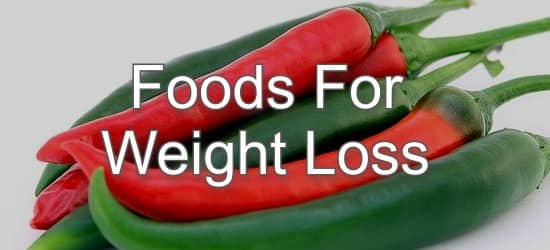
Overweight and obesity are increasing worldwide, having almost tripled since 1975. The World Health Organisation estimates that just under 2 billion adults worldwide are now either overweight or obese. Two-thirds of Americans are either overweight or obese and with this comes an increased risk of various health problems including heart disease, stroke, type II diabetes, osteoarthritis, and certain cancers.
To reduce weight, it is important to follow a healthy, balanced diet, reduce your intake of foods high in sugar and unhealthy fats, increase consumption of fruits, vegetables, legumes, whole grains, and nuts and stay physically active.
The following foods may also help. They are not simply low calorie foods (although eating plenty of low-calorie foods is essential when trying to manage your weight). The foods below were selected for their ability to support weight loss through mechanisms beyond eating low calorie.
There are several mechanisms through which specific foods can encourage weight loss; some boost metabolic rate, which is the amount of energy or calories your body burns to maintain its vital functions. Others suppress appetite or increase satiety, keeping you feeling full for longer, which results in eating less. Others may reduce fat absorption or storage or even increase fat burning.
The only certain method for losing weight is to take in less energy than you expend. However, the following foods may help a little as part of a healthy eating plan and are all healthy additions to any diet.
You may also find the following weight loss meal plan helpful.
-
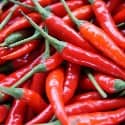 1. Chillies + Add
Chilies contain a substance called capsaicin, the compound that gives them their heat. Capsaicin also demonstrates various weight loss enhancing effects. It appears to slightly boost both metabolic rate (1) and fat burning (2). One laboratory study found that it inhibited the growth of new fat cells (3) in a test tube at least. Studies in humans reveal that capsaicin also reduces hunger, increases feelings of fullness, and reduces the likelihood of overeating (4,5).
1. Chillies + Add
Chilies contain a substance called capsaicin, the compound that gives them their heat. Capsaicin also demonstrates various weight loss enhancing effects. It appears to slightly boost both metabolic rate (1) and fat burning (2). One laboratory study found that it inhibited the growth of new fat cells (3) in a test tube at least. Studies in humans reveal that capsaicin also reduces hunger, increases feelings of fullness, and reduces the likelihood of overeating (4,5).
Nutrition Facts for Raw Red Chili Peppers. -
 2. Green Tea + Add
Green Tea is a rich source of a type of phytonutrients (natural plant substances) called catechins, in particular EGCG (epigallocatechin gallate). Research shows that EGCG can lead to small reductions in body fat and weight in overweight people (6,7). It works via several mechanisms including suppressing appetite, reducing fat absorption, increasing fat burning, fat elimination from the body, and finally by increasing energy expenditure (7).
2. Green Tea + Add
Green Tea is a rich source of a type of phytonutrients (natural plant substances) called catechins, in particular EGCG (epigallocatechin gallate). Research shows that EGCG can lead to small reductions in body fat and weight in overweight people (6,7). It works via several mechanisms including suppressing appetite, reducing fat absorption, increasing fat burning, fat elimination from the body, and finally by increasing energy expenditure (7).
Nutrition Facts for Green Tea. -
 3. Fermented Foods (Kimchi, Sauerkraut) + Add
There are pronounced differences between the gut bacteria of obese and lean people. When people lose weight, their microflora reverts to that observed in lean subjects, leading scientists to deduce that obesity has a microbial component (8). Several studies have confirmed that probiotics can help reduce weight, waist circumference, and body fat percentage, along with improving blood sugar control and reducing cholesterol levels (9,10,11,12).
3. Fermented Foods (Kimchi, Sauerkraut) + Add
There are pronounced differences between the gut bacteria of obese and lean people. When people lose weight, their microflora reverts to that observed in lean subjects, leading scientists to deduce that obesity has a microbial component (8). Several studies have confirmed that probiotics can help reduce weight, waist circumference, and body fat percentage, along with improving blood sugar control and reducing cholesterol levels (9,10,11,12).
Nutrition Facts for Kimchi. -
 4. Spirulina + Add
Spirulina is a blue-green algae, sometimes referred to as a "complete food" due to its rich nutrient content. Research shows that spirulina can reduce body fat, waist circumference, appetite, and cholesterol levels in people with overweight and obesity (13,14). One study found that a gram of spirulina for 12 weeks resulted in decreased appetite and 3.5lbs weight loss (15). Another gave 2 grams for 12 weeks and reported reduced weight, waist circumference, body fat, and appetite (16).
4. Spirulina + Add
Spirulina is a blue-green algae, sometimes referred to as a "complete food" due to its rich nutrient content. Research shows that spirulina can reduce body fat, waist circumference, appetite, and cholesterol levels in people with overweight and obesity (13,14). One study found that a gram of spirulina for 12 weeks resulted in decreased appetite and 3.5lbs weight loss (15). Another gave 2 grams for 12 weeks and reported reduced weight, waist circumference, body fat, and appetite (16).
Nutrition Facts for Raw Spirulina. -
 5. Oats + Add
Research shows that people who eat more whole grains tend to be slimmer (17). Oats are especially high in soluble fiber, which has been shown to help people lose weight and reduce waist circumference (18). These effects are due to soluble fiber keeping us feeling full for longer, along with slowing down the rate at which sugar is absorbed. Fiber also has prebiotic qualities, feeding "friendly" bacteria in the gut (19).
5. Oats + Add
Research shows that people who eat more whole grains tend to be slimmer (17). Oats are especially high in soluble fiber, which has been shown to help people lose weight and reduce waist circumference (18). These effects are due to soluble fiber keeping us feeling full for longer, along with slowing down the rate at which sugar is absorbed. Fiber also has prebiotic qualities, feeding "friendly" bacteria in the gut (19).
Nutrition Facts for Cooked Oatmeal. -
 6. Eggs + Add
Eggs are a top source of protein, which is known to have a high satiety value, meaning it keeps you feeling full for longer. It does this by triggering the release of a hormone called peptide YY in the small intestine, which reduces appetite (20). One study found that eating two eggs for breakfast resulted in 65% more weight loss and 34% greater reduction in waist circumference compared to a calorie matched high-carbohydrate breakfast (21). Another found that 2 eggs for breakfast resulted in eating 400 calories less over the rest of the day (22).
6. Eggs + Add
Eggs are a top source of protein, which is known to have a high satiety value, meaning it keeps you feeling full for longer. It does this by triggering the release of a hormone called peptide YY in the small intestine, which reduces appetite (20). One study found that eating two eggs for breakfast resulted in 65% more weight loss and 34% greater reduction in waist circumference compared to a calorie matched high-carbohydrate breakfast (21). Another found that 2 eggs for breakfast resulted in eating 400 calories less over the rest of the day (22).
Nutrition Facts for Hard Boiled Eggs. -
 7. Almonds + Add
Despite their high energy density, people who consume nuts every day, actually tend to be slimmer than those who don't. Almonds in particular, have been shown to be beneficial for people trying to lose weight, by reducing hunger and even possibly boosting metabolism (23). For example, one study found that 50g almonds per day for 3 months led to reductions in weight, waist circumference, cholesterol, and blood pressure in 100 overweight women. (24)
7. Almonds + Add
Despite their high energy density, people who consume nuts every day, actually tend to be slimmer than those who don't. Almonds in particular, have been shown to be beneficial for people trying to lose weight, by reducing hunger and even possibly boosting metabolism (23). For example, one study found that 50g almonds per day for 3 months led to reductions in weight, waist circumference, cholesterol, and blood pressure in 100 overweight women. (24)
Nutrition Facts for Almonds. -
 8. Oily Fish + Add
Omega-3 fish oils don't actually cause weight loss, but have been shown to improve metabolic health, reduce waist circumference (25) and prevent weight gain (26). Omega-3s have anti-inflammatory effects that may improve the metabolic functioning of fat tissue, which is involved in appetite regulation (27,28). One study found that omega-3 supplements for 12 weeks, led to weight loss in 65 obese women with depression. There was also an improvement in their depression symptoms, which could have caused the weight loss (29).
8. Oily Fish + Add
Omega-3 fish oils don't actually cause weight loss, but have been shown to improve metabolic health, reduce waist circumference (25) and prevent weight gain (26). Omega-3s have anti-inflammatory effects that may improve the metabolic functioning of fat tissue, which is involved in appetite regulation (27,28). One study found that omega-3 supplements for 12 weeks, led to weight loss in 65 obese women with depression. There was also an improvement in their depression symptoms, which could have caused the weight loss (29).
Nutrition Facts for Cooked Atlantic Salmon (Farmed). -
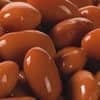 9. Beans + Add
Beans and other pulses such as lentils, peas and chickpeas provide soluble fiber along with a healthy dose of plant-based protein, both of which help appetite control. Regularly eating pulses has been shown to lead to modest weight loss and reduced body fat percentage, even without following a calorie restricted diet (30). Meals containing pulses have also been shown to keep people feeling 31% more full and satisfied (31). One study found that eating 2 servings of pulses and 4 servings of wholegrains per day for 18 months reduced waist circumference and improved nutritional status (32).
9. Beans + Add
Beans and other pulses such as lentils, peas and chickpeas provide soluble fiber along with a healthy dose of plant-based protein, both of which help appetite control. Regularly eating pulses has been shown to lead to modest weight loss and reduced body fat percentage, even without following a calorie restricted diet (30). Meals containing pulses have also been shown to keep people feeling 31% more full and satisfied (31). One study found that eating 2 servings of pulses and 4 servings of wholegrains per day for 18 months reduced waist circumference and improved nutritional status (32).
Nutrition Facts for Cooked Blackeyed Peas (Immature Seeds). -
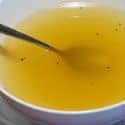 10. Soup + Add
A population study carried out in the US found that the more soup people consume, the less likely they are to be overweight (33). One study found that eating soup at the beginning of a meal can fill you up and reduce the amount you eat during the rest of the meal by 20% (34). Liquid foods like soup increase feelings of fullness by delaying gastric emptying, which is the time taken for the stomach to empty (35).
10. Soup + Add
A population study carried out in the US found that the more soup people consume, the less likely they are to be overweight (33). One study found that eating soup at the beginning of a meal can fill you up and reduce the amount you eat during the rest of the meal by 20% (34). Liquid foods like soup increase feelings of fullness by delaying gastric emptying, which is the time taken for the stomach to empty (35).
See the complete list of soups low in calories.
Nutrition Facts for Vegetable Broth. -
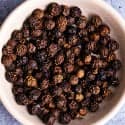 11. Black Pepper + Add
Black Pepper contains an active component called piperine, which gives its pungent flavor and may also support weight loss (36). Muscle tissue is known as an "active tissue", as it consumes energy even at rest. There is evidence that piperine may increase the rate at which muscles consume energy, which means the body burns more calories (37). Piperine also has antioxidant and anti-inflammatory effects in the body and can reduce insulin-resistance (36).
11. Black Pepper + Add
Black Pepper contains an active component called piperine, which gives its pungent flavor and may also support weight loss (36). Muscle tissue is known as an "active tissue", as it consumes energy even at rest. There is evidence that piperine may increase the rate at which muscles consume energy, which means the body burns more calories (37). Piperine also has antioxidant and anti-inflammatory effects in the body and can reduce insulin-resistance (36).
Nutrition Facts for Black Pepper. -
12. Avocado + Add
Traditionally thought of as "fattening" avocados can actually help weight control by increasing satiety and reducing appetite. Research shows that people who eat avocados regularly are less likely to become overweight over time (38). One study found that eating half an avocado for lunch reduced the desire to eat by 28% for 5 hours afterward (39). Another study found that one avocado per day supported weight loss as part of a calorie-controlled diet and led to favorable changes in gut bacteria (40)
Nutrition Facts for Avocados.
Tips for Healthy Weight Loss
- Eating Patterns - In order to lose weight, you need to reduce your caloric intake. Some people find that it's easier to eat smaller amounts regularly throughout the day, which can help to prevent unpleasant drops in blood sugar. Others prefer to use intermittent fasting, an approach that restricts eating to a certain time period each day or includes certain days with minimal to no calorie intake. Research has shown that both approaches can be effective, so you can choose the one that works better for you. (41)
- Sleep - Sleep deprivation leads to the production of a hormone called ghrelin that stimulates appetite and encourages eating energy-dense foods. Good quality sleep on the other hand promotes leptin production, a hormone that helps regulate appetite and energy levels.
- Physical Activity - as well as burning calories, exercise lowers stress hormones and stimulates the release of "feel-good" chemicals in the brain that lead to healthier behaviors and food choices. Resistance exercise such as weight lifting also builds muscle, which increases metabolic rate.
- Low Stress - The stress hormone cortisol encourages fat storage, especially in the abdominal region, as well as increased appetite and cravings for high calorie, sugary foods. Stress management techniques such as yoga, meditation, and spending time in nature are therefore beneficial.
- Fruits & Vegetables - Eating plenty of fruits and vegetables is associated with having a lower body weight and better overall health. Fruit and vegetables have a low energy density, so they fill you up without providing too many calories. Aim for 7-10 servings per day.
- Eat Whole Foods - Consumption of highly processed or 'ultra-processed' foods is linked with obesity (42,43,44,45,46). These foods may interfere with metabolism, insulin regulation, and appetite regulation. Limit or avoid these foods and ensure at least 80% of your diet comes from whole foods.
Related
Data Sources and References
- Janssens PL, Hursel R, Westerterp-Plantenga MS. Acute administration of capsaicin increases resting energy expenditure in young obese subjects without affecting energy intake, appetite, and circulating levels of orexigenic/anorexigenic peptides Appetite. 2014 Jun;77:44-9. doi: 10.1016/j.appet.2014.02.018. Epub 2014 Mar 12. 24630935
- Tremblay A, Chaput JP, Bérubé-Parent S, Prud'homme D, Leblanc C, Alméras N, Després JP. Effects of novel capsinoid treatment on fatness and energy metabolism in humans: possible pharmacogenetic implications Eur J Clin Pharmacol. 2007 Feb;63(2):123-34. doi: 10.1007/s00228-006-0220-1. Epub 2007 Jan 3. 17200837
- Yang JY, Della-Fera MA, Hartzell DL, Nelson-Dooley C, Hausman DB, Baile CA. Effects of capsaicin on induction of apoptosis and inhibition of adipogenesis in 3T3-L1 cells Obesity (Silver Spring). 2006 Oct;14(10):1691-9. doi: 10.1038/oby.2006.194. 17062797
- Rigamonti AE, Casnici C, Marelli O, De Col A, Tamini S, Lucchetti E, Tringali G, De Micheli R, Abbruzzese L, Bortolotti M, Cella SG, Sartorio A. Capsaicin increases sensation of fullness in energy balance, and decreases desire to eat after dinner in negative energy balance Nutr Res. 2018 Apr;52:71-79. doi: 10.1016/j.nutres.2018.02.002. Epub 2018 Feb 10. 29530622
- Yoshioka M, St-Pierre S, Drapeau V, Dionne I, Doucet E, Suzuki M, Tremblay A. Effects of capsaicin, green tea and CH-19 sweet pepper on appetite and energy intake in humans in negative and positive energy balance Br J Nutr. 1999 Aug;82(2):115-23. 10743483
- Hursel R, Westerterp-Plantenga MS. [Effects of green tea and its epigallocatechin (EGCG) content on body weight and fat mass in humans: a systematic review] Am J Clin Nutr. 2009 Mar;89(3):822-30. doi: 10.3945/ajcn.2008.27043. Epub 2009 Jan 28. 19176733
- Boon N. The anti-obesity effects of green tea in human intervention and basic molecular studies Int J Vitam Nutr Res. 2008 Dec;78(6):275-81. doi: 10.1024/0300-9831.78.6.275. 19685436
- Bajzer M, Seeley RJ. Microbial ecology: human gut microbes associated with obesity Nature. 2006 Dec 21;444(7122):1009-10. doi: 10.1038/4441009a. 17183300
- Maharlouei N, Tabrizi R, Lankarani KB, Rezaianzadeh A, Akbari M, Kolahdooz F, Rahimi M, Keneshlou F, Asemi Z. The Potential Role of Probiotics in Controlling Overweight/Obesity and Associated Metabolic Parameters in Adults: A Systematic Review and Meta-Analysis Crit Rev Food Sci Nutr. 2019;59(11):1753-1766. doi: 10.1080/10408398.2018.1427044. Epub 2018 Feb 2. 29393665
- International BR. A Review on Role of Microbiome in Obesity and Antiobesity Properties of Probiotic Supplements Biomed Res Int. 2022 Sep 13;2022:9836248. doi: 10.1155/2022/9836248. eCollection 2022. 36147641
- Azad MAK, Sarker M, Li T, Yin J. Probiotics: How Effective Are They in the Fight against Obesity? Biomed Res Int. 2018 May 8;2018:9478630. doi: 10.1155/2018/9478630. eCollection 2018. 29854813
- Fuller NR. Effects of probiotics on body weight, body mass index, fat mass and fat percentage in subjects with overweight or obesity: a systematic review and meta-analysis of randomized controlled trials Obes Rev. 2018 Aug;19(8):1173. doi: 10.1111/obr.12687. Epub 2018 Mar 8. 29520962
- Zarezadeh M, Faghfouri AH, Radkhah N, Foroumandi E, Khorshidi M, Rasouli A, Zarei M, Mohammadzadeh Honarvar N, Hazhir Karzar N, Ebrahimi Mamaghani M. Effects of Spirulina supplementation on obesity: A systematic review and meta-analysis of randomized clinical trials Phytother Res. 2021 Feb;35(2):577-586. doi: 10.1002/ptr.6834. Epub 2020 Sep 23. 32967062
- Hernández-Lepe MA, Wall-Medrano A, López-Díaz JA, Juárez-Oropeza MA, Hernández-Torres RP, Ramos-Jiménez A. Effects of spirulina on weight loss and blood lipids: a review Mar Drugs. 2019 May 7;17(5):270. doi: 10.3390/md17050270. 31067674
- Yousefi R, Mottaghi A, Saidpour A. The effects of Spirulina Platensis on anthropometric indices, appetite, lipid profile and serum vascular endothelial growth factor (VEGF) in obese individuals: a randomized double blinded placebo controlled trial Complement Ther Med. 2018 Oct;40:106-112. doi: 10.1016/j.ctim.2018.08.003. Epub 2018 Aug 17. 30219433
- Zeinalian R, Farhangi MA, Shariat A, Saghafi-Asl M. Spirulina platensis effectively ameliorates anthropometric measurements and obesity-related metabolic disorders in obese or overweight healthy individuals: A randomized controlled trial BMC Complement Altern Med. 2017 Apr 21;17(1):225. doi: 10.1186/s12906-017-1670-y. 28431534
- O'Neil CE, Zanovec M, Cho SS, Nicklas TA. Whole grain intake in relation to body weight: from epidemiological evidence to clinical trials Nutr Res. 2010 Dec;30(12):815-22. doi: 10.1016/j.nutres.2010.10.013. 21147364
- Hjorth MF, Astrup A. Can dietary viscous fiber affect body weight independently of an energy-restrictive diet? A systematic review and meta-analysis of randomized controlled trials Am J Clin Nutr. 2020 Feb 1;111(2):242-243. doi: 10.1093/ajcn/nqz334. 31915808
- Brahe LK, Astrup A, Larsen LH. Targeting Carbohydrates and Polyphenols for a Healthy Microbiome and Healthy Weight Adv Nutr. 2016 Jan 15;7(1):90-101. doi: 10.3945/an.115.010587. Print 2016 Jan. 26773017
- Chaudhri OB, Field BC, Bloom SR. Gut hormones and appetite control Int J Obes (Lond). 2008 Dec;32 Suppl 7:S28-31. doi: 10.1038/ijo.2008.235. 19136988
- Vander Wal JS, Marth JM, Khosla P, Jen KL, Dhurandhar NV. Egg breakfast enhances weight loss J Am Coll Nutr. 2005 Dec;24(6):510-5. doi: 10.1080/07315724.2005.10719497. 16373948
- Ratliff J, Leite JO, de Ogburn R, Puglisi MJ, VanHeest J, Fernandez ML. Short-term effect of eggs on satiety in overweight and obese subjects Nutr Res. 2010 Feb;30(2):96-103. doi: 10.1016/j.nutres.2010.01.002. 20226994
- Ojo O, Wang XH, Ojo OO, Adegboye ARA. A Comprehensive Review of Almond Clinical Trials on Weight Measures, Metabolic Health Biomarkers and Outcomes, and the Gut Microbiota Nutrients. 2021 Sep 26;13(10):3377. doi: 10.3390/nu13103377. 34684378
- Dreher ML. The effect of almonds on anthropometric measurements and lipid profile in overweight and obese females in a weight reduction program: A randomized controlled clinical trial Nutrients. 2021 Jun 8;13(6):1968. doi: 10.3390/nu13061968. 34201139
- Zhang Y, Liu W, Liu D, Zhao T, Tian H. Efficacy of Omega-3 Polyunsaturated Fatty Acids Supplementation in Managing Overweight and Obesity: A Meta-Analysis of Randomized Clinical Trials Nutrients. 2016 Jun 23;8(7):388. doi: 10.3390/nu8070388. 27347994
- Martínez-Fernández L, Laiglesia LM, Huerta AE, Martínez JA, Moreno-Aliaga MJ. Omega-3 fatty acids in obesity and metabolic syndrome: a mechanistic update Prostaglandins Other Lipid Mediat. 2015 Sep;121(Pt A):24-41. doi: 10.1016/j.prostaglandins.2015.07.003. Epub 2015 Jul 26. 26219838
- Hames KC, Morgan-Bathke M, Harteneck DA, Zhou L, Port JD, Lanza IR, Jensen MD. (n-3) Fatty acids alleviate adipose tissue inflammation and insulin resistance: mechanistic insights Am J Clin Nutr. 2017 Jun;105(6):1552-1558. doi: 10.3945/ajcn.116.148114. Epub 2017 Apr 19. 28424185
- Martínez-Fernández L, Laiglesia LM, Huerta AE, Martínez JA, Moreno-Aliaga MJ. Omega-3 fatty acids in obesity and metabolic syndrome: a mechanistic update Prostaglandins Other Lipid Mediat. 2015 Sep;121(Pt A):24-41. doi: 10.1016/j.prostaglandins.2015.07.003. Epub 2015 Jul 26. 26219838
- Miller BJ, Murray L, Beckmann MM, Kent T, Macfarlane B. Omega-3 supplementation effects on body weight and depression among dieter women with co-morbidity of depression and obesity compared with the placebo: A randomized clinical trial Cochrane Database Syst Rev. 2013 Oct 24;2013(10):CD009104. doi: 10.1002/14651858.CD009104.pub2. 24158923
- Jovanovski E, Mazhar N, Komishon A, Khayyat R, Li D, Blanco Mejia S, Khan T, L Jenkins A, Smircic-Duvnjak L, L Sievenpiper J, Vuksan V. Effects of dietary pulse consumption on body weight: a systematic review and meta-analysis of randomized controlled trials Am J Clin Nutr. 2020 Feb 1;111(2):471-485. doi: 10.1093/ajcn/nqz292. 31897475
- Kim SJ, de Souza RJ, Choo VL, Ha V, Cozma AI, Chiavaroli L, Mirrahimi A, Blanco Mejia S, Di Buono M, Bernstein AM, Leiter LA, Kris-Etherton PM, Vuksan V, Beyene J, Kendall CW, Jenkins DJ, Sievenpiper JL. Dietary pulses, satiety and food intake: a systematic review and meta-analysis of acute feeding trials Am J Clin Nutr. 2016 May;103(5):1213-23. doi: 10.3945/ajcn.115.124677. Epub 2016 Mar 30. 27030531
- Maki KC, Beiseigel JM, Jonnalagadda SS, Gugger CK, Reeves MS, Farmer MV, Kaden VN, Rains TM. The effect of increasing consumption of pulses and wholegrains in obese people: a randomized controlled trial J Am Diet Assoc. 2010 Feb;110(2):205-14. doi: 10.1016/j.jada.2009.10.037. 20102847
- O'Neil CE, Keast DR, Nicklas TA, Fulgoni VL 3rd. Soup consumption is associated with a reduced risk of overweight and obesity but not metabolic syndrome in US adults: NHANES 2003-2006 Nutr Res. 2012 Mar;32(3):185-94. doi: 10.1016/j.nutres.2012.01.005. 22464805
- Rolls BJ, Roe LS, Meengs JS. Soup preloads in a variety of forms reduce meal energy intake J Am Diet Assoc. 2004 Oct;104(10):1570-6. doi: 10.1016/j.jada.2004.07.001. 15389416
- Thondre PS, Shafat A, Clegg ME. Soups increase satiety through delayed gastric emptying yet increased glycaemic response Br J Nutr. 2013 Dec;110(12):2173-9. doi: 10.1017/S0007114513001682. Epub 2013 Jun 7. 23742725
- Imran M, Samal M, Qadir A, Ali A, Mir SR. Piperine: A review of its biological effects Polim Med. 2022 Jan-Jun;52(1):31-36. doi: 10.17219/pim/145512. 35196422
- Tolkatchev D, Elnatan D, Nogara L, Ly T, Naber N, Haak K, Meech R, Cooke R, Kostyukova AS. Piperine's mitigation of obesity and diabetes can be explained by its up-regulation of the metabolic rate of resting muscle Arch Biochem Biophys. 2018 Dec 1;659:75-84. doi: 10.1016/j.abb.2018.09.027. Epub 2018 Oct 2. 30287237
- Fulgoni VL 3rd, Dreher M, Davenport AJ. Avocado Intake, and Longitudinal Weight and Body Mass Index Changes in an Adult Cohort Nutr J. 2013 Jan 2;12:1. doi: 10.1186/1475-2891-12-1. 23282226
- Dreher ML, Cheng FW, Ford NA. A randomized 3×3 crossover study to evaluate the effect of Hass avocado intake on post-ingestive satiety, glucose and insulin levels, and subsequent energy intake in overweight adults Nutrients. 2021 Dec 7;13(12):4376. doi: 10.3390/nu13124376. 34959933
- Dreher ML, Cheng FW, Ford NA. Hass Avocado Inclusion in a Weight-Loss Diet Supported Weight Loss and Altered Gut Microbiota: A 12-Week Randomized, Parallel-Controlled Trial Nutrients. 2021 Dec 7;13(12):4376. doi: 10.3390/nu13124376. 34959933
- Sainsbury A, Wood RE, Seimon RV, Hills AP, King NA, Gibson AA, Byrne NM. Do intermittent diets provide physiological benefits over continuous diets for weight loss? A systematic review of clinical trials Obes Rev. 2018 Dec;19 Suppl 1:47-60. doi: 10.1111/obr.12787. 30511512
- Monteiro CA, Moubarac JC, Levy RB, Canella DS, Louzada MLDC, Cannon G. Ultra-processed food products and obesity in Brazilian households (2008-2009) Public Health Nutr. 2018 Jan;21(1):18-26. doi: 10.1017/S1368980017001379. Epub 2017 Jul 17. 28714422
- Schrader LA. Ultraprocessed food consumption and risk of overweight and obesity: the University of Navarra Follow-Up (SUN) cohort study Am J Clin Nutr. 2017 Apr;105(4):1011. doi: 10.3945/ajcn.116.149146. 28373305
- Juul F, Martinez-Steele E, Parekh N, Monteiro CA, Chang VW. Ultra-processed food consumption and indicators of obesity in the United Kingdom population (2008-2016) Br J Nutr. 2018 Jul;120(1):90-100. doi: 10.1017/S0007114518001046. Epub 2018 May 6. 29729673
- Rauber F, Steele EM, Louzada MLDC, Millett C, Monteiro CA, Levy RB. Ultra-processed food consumption and excess weight among US adults PLoS One. 2020 May 1;15(5):e0232676. doi: 10.1371/journal.pone.0232676. eCollection 2020. 32357191
- Nardocci M, Leclerc BS, Louzada ML, Monteiro CA, Batal M, Moubarac JC. Consumption of ultra-processed foods and obesity in Canada Can J Public Health. 2019 Feb;110(1):15-16. doi: 10.17269/s41997-018-0142-6. 30353503
Simplify Nutrition Tracking with MyFoodData!
Speedy Tools and Detailed Data FREEEasily analyze your meals to find the best foods for your goals.
✅ Use our recipe nutrition calculator and nutrition comparison tool.
✅ Access expert nutrition data tools and in-depth articles.
✅ Log foods and organize your recipes with a free account.


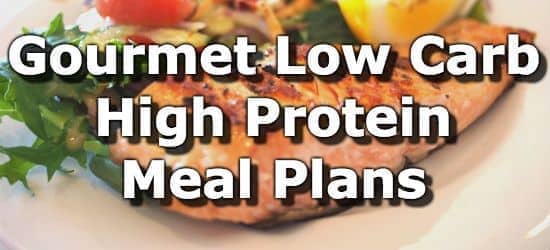 Next ➞
Next ➞
